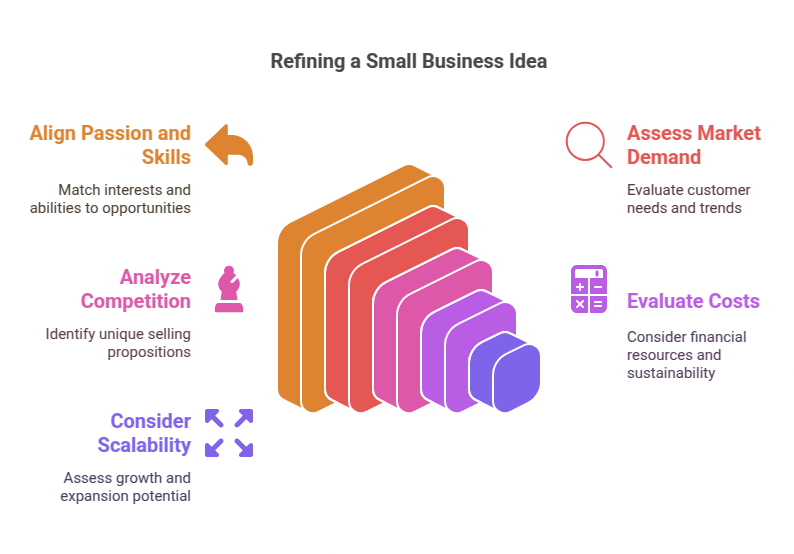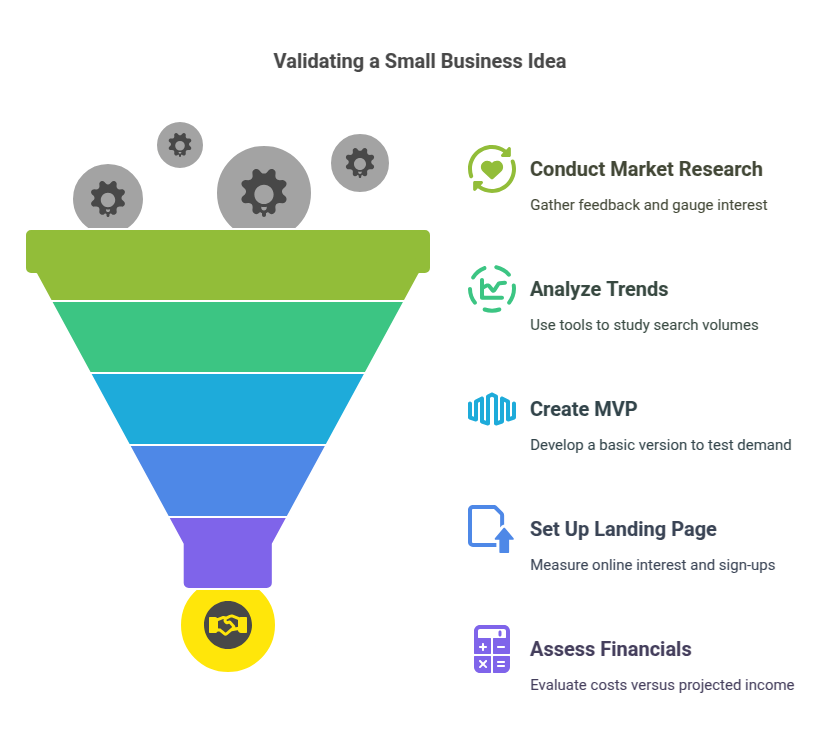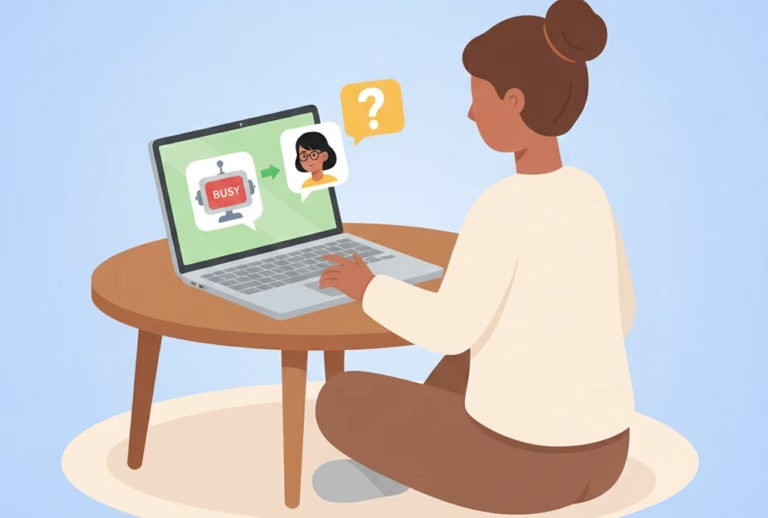Starting a business can be a life-changing decision, offering control over your career and the potential for significant rewards. Are you an aspiring entrepreneur searching for the perfect small business idea to launch your dream?
This guide provides an extensive list of the most promising best business ideas for starting today, covering various industries and investment levels. We’ll explore key factors to consider when choosing a small business, how to validate your business idea, and common startup challenges.
Every groundbreaking business starts with a single spark—just one idea. Whether you’re looking for inspiration or exploring new opportunities, starting a new business is a big deal. Small business ideas often come from entrepreneurs who desire to pursue their passions, gain a better balance between their personal and professional lives, and have the autonomy of being their boss.
A significant motivating factor for many individuals to start a small business is the opportunity to control their finances and build equity. In 2024, women-owned businesses in the U.S. generated a remarkable $2.7 trillion in sales, underscoring the substantial potential within the realm of small business ideas and entrepreneurship.
Discover 100+ Best Small Business Ideas Across Industries
Here is a list of over 100 business ideas:
- Freelance writer: Offer your writing services for websites, blogs, and other content needs.
- Caterer: Create and deliver tasty homemade meals for individuals and events.
- Virtual assistant: Provide administrative, technical, or creative assistance to clients from a remote location.
- Seamstress: Offer clothing alterations, custom designs, and repair services.
- Pet sitter: Look after pets in their owners’ homes or your own while they are away.
- Bookkeeper: Manage financial records and transactions for businesses.
- Affiliate marketer: Earns commission by promoting other people’s products or services online.
- Social media manager: Helps businesses manage their social media presence and content.
- Drop shipper: Sell products online without holding inventory by partnering with suppliers who ship directly to customers.
- Graphic designer: Create visual content such as logos, marketing materials, and website designs.
- Translator: Provides language translation services for documents and conversations.
- IT support: Offer remote technical assistance for computer systems and software.
- Cleaning service provider: They offer house or office cleaning services.
- Landscaper: Provide gardening and lawn care services.
- Event planner: Help clients organize and manage weddings, parties, and corporate events.
- Handyman: Offers a range of home-repair and maintenance services.
- Beauty therapist: Provides mobile beauty treatments like hairstyling, facials, and massages.
- Tutor: Offer academic or skills-based instruction to students.
- Dog walker: Provide dog-walking services for busy pet owners.
- Clothing reseller: Customize and sell clothing through online marketplaces.
- Food producers: Create and sell artisanal food products.
- Furniture-maker: Designs and sells custom-made furniture.
- Florist: Create and deliver flower arrangements for various occasions.
- Food truck business: Operate a mobile kitchen serving meals at different locations.
- Costume designer: I create unique costumes for theater, cosplay, and events.
- Property Stylist: Prepare homes for sale or rental by arranging furniture and decor.
- Pet photographer: Specializes in taking pictures of pets.
- Personal trainer: Helps clients achieve their fitness goals through exercise and diet plans.
- Life coach: Offers guidance and support to help people achieve personal and professional goals.
- Tour guide: Lead guided tours showcasing local attractions and culture.
- Travel consultant: Help clients plan and book their ideal vacations.
- Online course creator: Develop and sell courses on a variety of subjects.
- Yoga instructor: Teach yoga classes in studios, private sessions, or online.
- Jewelry brand owner: Design and sell your jewelry creations.
- Stylist: Offer fashion advice and styling services.
- Personal chef: Cook nutritious and delicious meals for busy professionals.
- Esthetician: Provides skincare treatments and opens their beauty salon.
- Make-up artist: Offer make-up services for events, photoshoots, and individuals.
- Freelance illustrator: Create illustrations for various clients and projects.
- Ghostwriter: Write content such as blog posts, articles, and books anonymously.
- Video editor: Edit video footage for commercial and private clients.
- Podcast producer: Offer audio editing and production services for podcasts.
- Freelance web developer: Built and maintained websites for businesses and individuals.
- PR agency owner: Help clients craft their identities and grow their businesses through public relations.
- Online community founder: Creates and manages online communities for people with shared interests.
- Travel agency owner: Plans and books travel arrangements for clients.
- Wedding planner: Assist couples in organizing their weddings.
- Amazon store owner: Sells products through the Amazon marketplace.
- Consultant: Provide expert advice in your area of expertise.
- Sell art: Create and sell your artwork online or in person.
- Customer service provider: Offer customer support services.
- Candlemaker: Create and sell handmade candles.
- Organization expert: Helps people organize their homes and lives.
- Podcast host: Create and distribute your podcast content.
- Voice actress: Narrate audiobooks and other audio content.
- Blogger: Create and monetize a blog on a topic you are passionate about.
- Proofreader: Reviews written content for errors in grammar, spelling, and punctuation.
- Freelance editor: Edit written content for clarity, grammar, and style.
- Sell on Etsy: Open an online store to sell handmade goods, vintage items, and digital products.
- Résumé writer: Created and edited résumés and cover letters for job seekers.
- Digital designer: Creates digital artwork, graphics, and animations.
- Online dating consultant: Helps people navigate the world of online dating.
- T-shirt designer: Create and sell custom t-shirt designs through print-on-demand services.
- House-sitter: Look after people’s homes while they are away.
- Personal assistant: Help business owners with administrative and personal tasks.
- Airbnb host: Rent out spare rooms or properties to travelers.
- Pool host: Rent out your swimming pool by the hour or day.
- Backyard host: Rent out your backyard space for events.
- Car rental provider: Rent out your car when you’re not using it.
- Baker: Baked and sold baked goods.
- Car washer: Offer car cleaning services.
- Child-care provider: Offer babysitting or daycare services.
- Newsletter author: Create and distribute a newsletter on a specific topic.
- Bike mechanic: Repair and build bicycles.
- Self-published author: Write and publish your books.
- Digital creator: Produce digital products like music, courses, and templates.
- App developer: Creates and sells mobile applications.
- Website developer: Designs, builds, and maintains websites.
- Data entry clerk: Collects, stores, and manages data for businesses.
- Socially responsible business owner: Start a business with a mission to support a cause.
- Pet business owner: Sell pet-related products or offer pet services.
- Membership program founder: Create a subscription-based service offering exclusive content or benefits.
- Virtual event planner: Organize and manage online events.
- Vending machine owner: Own and operate vending machines in high-traffic locations.
- Personal chef: Prepare meals for clients with specific dietary needs or for special occasions.
- Meal prep specialist: Prepare and deliver ready-made meals to clients.
- Mover: Offer assistance with moving and relocation.
- Voiceover artist: Provide voice recordings for various projects.
- Master class host: Teach online master classes on your area of expertise.
- Professional organizer: Help clients declutter and organize their spaces.
- Personal shopper: Assists clients with their shopping needs.
- Poster and card illustrator: Create and sell illustrated posters and cards.
- Online boutique owner: Curates and sells fashion items online.
- Craftsperson: creates and sells handmade crafts.
- Photographer: Offers photography services and sells prints.
- Beauty entrepreneur: Launch an online business selling beauty products.
- Phone accessories seller: Sell phone cases and accessories online.
- Subscription box provider: Curate and ship themed boxes of products to subscribers.
- Alterations specialist: Offer clothing alteration services.
- Furniture restorer: Refurbished and sold used furniture.
- Massage therapist: Provides massage therapy services.
- Bed and breakfast owner: Operate a small lodging establishment.
- Delicatessen owner: Open a specialty food store.
- Coffee shop owner: Start a local coffee shop.
- Stationery store owner: Sell paper goods and related items.
- Vintage store owner: Sells secondhand or vintage clothing and goods.
- Dog groomer: Offers pet grooming services.
- Accountant: Provides accounting and tax services.
- Notary public: Witnesses and attests to the legalities of certain documents.
- General construction: Offer construction services.
- Electrical work: Provide electrical installation and repair services.
- Moving services: Help individuals and families relocate.
- Content and editorial contracting: Offer freelance writing and editing services.
- Marketing agency owner: Help businesses with their marketing strategies and campaigns.
- Public relations agency owner: Assist clients with managing their public image.
- Social media marketing enterprise owner: Manage social media for businesses.
- Art business owner: Sell your artwork or offer art-related services.
- Appliance repair: Offer repair services for household appliances.
- Real estate agent: Helps clients buy, sell, and rent properties.
- Private chef service owner: offers personalized cooking services.
- Brewery owner: Start a local brewery.
- Making gift baskets: Create and sell curated gift baskets.
- Hair styling/barber shop owner: Offers hair care services.
- Self-storage business owner: Provide storage units for rent.
- Independent car service/ride-sharing driver: These offer private transportation services.
- Online reselling business owner: Buys and sells items online for profit.
- Buying a franchise: Invest in and operate a franchised business.
- College exams and applications consultant: Help students with college applications and exam preparation.
- Research service provider: Offer research services for academic, business, or genealogy needs.
- Music teacher: Provide private music lessons.
- Grant writer: Helps organizations and individuals secure grant funding.
- Career counselor: Provides career guidance and advice.
Key Factors to Consider When Choosing Your Small Business Idea

When embarking on the journey of starting a small business, several crucial factors deserve careful consideration to enhance your chances of success. Taking the time to thoughtfully evaluate these elements before diving in can help you choose a business idea with strong potential.
Aligning Your Passion and Skills with Business Opportunities
A fundamental step is to consider what truly interests and motivates you. As Martha Sinetar advised, pursuing work you genuinely enjoy can lead to financial success. Reflect on your existing skills and experiences.
Leverage your strengths and apply the lessons you’ve learned to your new venture. If you identify a business idea that aligns with your passions and utilizes your skills, you’re more likely to stay motivated and persevere through challenges.
Assessing Market Demand and Identifying Your Target Audience
Before committing to an idea, it’s essential to determine if there is a genuine need for your product or service. Conduct thorough market research to understand your potential customers and their needs. Analyze market trends, customer surveys, and sales data to gauge demand. Consider who your target audience will be and whether there are enough potential customers to sustain your business.
Analyzing Your Competition and Finding Your Unique Selling Proposition
Understanding your competition is crucial. Carefully evaluate what other businesses in your potential market are offering, their branding, and their messaging. Look for ways to differentiate your business by offering something unique.
This could be better pricing, superior customer service, innovative features, or a novel approach to meeting customer needs. If competitors are thriving, it indicates existing demand.
Evaluating Startup Costs and Financial Sustainability
Consider your financial resources. While some businesses can start with minimal funding, having a financial cushion can reduce stress.
Explore funding options like personal savings, loans from friends and family, SBA loans, or crowdfunding. Critically assess the long-term financial sustainability of your business idea. Calculate all potential costs, including overhead, team expenditures, and associated fees, and compare them to your projected income to determine if your business can be profitable.
Considering Scalability and Long-Term Growth Potential
Think about the potential for your business to grow and expand over time. Can your business idea scale without significant limitations? Consider if you can leverage tools like artificial intelligence (AI) and analytics to make data-driven decisions that support growth. Track key performance indicators (KPIs) to measure the effectiveness of your growth strategies. A sustainable business has the potential for long-term success in a growing industry.
Time Commitment and Work-Life Balance Considerations
Assess the time commitment required to launch and run your business. Can you dedicate yourself full-time, or will you start part-time? Prioritize tasks effectively, create routines, and utilize technology to streamline your work. It’s also important to consider setting clear work-life boundaries to avoid burnout. If you plan to grow, think about when and how you might delegate tasks.
Understanding Legal and Regulatory Requirements for Small Businesses
Ensure that your small business complies with all local laws, permits, and licenses. Research the regulations specific to your industry and make sure you understand your tax obligations. Your city or county’s official government website is a good starting point for finding information on local business laws and resources. Consulting with a legal professional can also help ensure you are operating within the bounds of the law.
Deciding Between a Local or Virtual Business Model
Consider whether your business will operate locally or virtually, as each model offers distinct advantages. Local businesses can foster community engagement and build trust through face-to-face interactions. Virtual businesses offer flexibility and a broader reach, tapping into global markets and often having lower overhead costs. Carefully weigh the benefits of each model about your business idea and target audience.
By carefully considering these key factors, you can lay a solid foundation for choosing a small business idea that aligns with your strengths, meets market needs, and has the potential for long-term success. Now, let’s explore some practical steps for validating your chosen small business idea.
Validating Your Small Business Idea for Success

To minimize risks and maximize your potential for success, it’s crucial to validate your small business idea before a full launch. This involves testing your concept through various methods to ensure there is genuine demand and that your business can be financially sustainable. By taking these actionable steps, you can gather valuable insights and make informed decisions about moving forward.
Conducting Market Research and Gathering Customer Feedback
One of the first steps in validation is to gauge the level of interest in your idea directly from your potential customers. You can achieve this by conducting market research through various channels. Consider sending out surveys to your target audience to gather specific feedback on your proposed products or services. Utilize social media platforms by creating polls or simply engaging with potential customers online to understand their needs and preferences. Direct interaction and feedback are invaluable in the early stages.
Utilizing Online Tools to Analyze Trends and Search Volumes
Beyond direct feedback, online tools can provide valuable data on market interest. Google Trends is an effective resource to analyze online trends and search volumes related to the products or services you plan to offer. By examining search interest over time, you can see if there’s a consistent demand or if the interest is fleeting. This analysis can help you understand the potential size and stability of your market.
Creating a Minimum Viable Product (MVP) to Test Demand
A practical way to test the waters is by creating a minimum viable product (MVP). An MVP is a simplified version of your product or service that includes only the core features necessary to attract early customers and validate your concept. By launching this basic version, you can test its performance in the real market and gather crucial feedback on what works and what doesn’t. This iterative approach allows you to refine your offering based on actual customer interaction before making significant investments.
Setting Up a Landing Page or Website to Gauge Interest
Establishing a basic online presence, such as a landing page or a simple website, can be an effective way to measure interest in your small business idea. Your landing page should clearly explain your product or service and include a call to action, such as an email sign-up form or an inquiry button. By tracking the number of sign-ups or inquiries, you can get a tangible measure of how many people are interested in learning more about what you plan to offer. This also provides an opportunity to start building an initial list of potential customers.
Analyzing Financial Growth Potential and Profitability
Ultimately, a viable small business idea needs to be financially sustainable. Take the time to calculate all potential costs, including startup expenses, operational fees, overhead, and any team expenditures. Compare these costs to your projected income based on your market research and pricing strategies. Determining if your business idea can generate enough revenue to cover costs and achieve profitability is a critical step in the validation process.
By diligently following these validation steps, you can gain confidence in your small business idea and make necessary adjustments before fully committing your resources. Now, let’s delve into some common startup challenges and how to overcome them.
Conclusion
Starting a small business is a significant undertaking, fueled by a single spark of an idea that holds immense potential. By exploring the diverse small business ideas available, from freelance writing to niche pet photography, aspiring entrepreneurs can find ventures that align with their passions and skills. The journey from that initial spark to lifelong success requires careful consideration of factors like your passion, whether to operate locally or virtually, and, crucially, the potential for profitability.
Whether you’re drawn to online businesses offering flexibility and broader reach, service-based businesses built on expertise and trust, product-based businesses celebrating unique creations, or niche businesses catering to specific needs, the possibilities are vast. Remember that a good small business idea should meet market demand, offer a competitive advantage, demonstrate potential for profitability, and be sustainable in the long run.
Leaping into small business ownership may seem daunting, but resources and tools are available to help. Validating your business idea through market research, analyzing trends, testing with an MVP, and assessing financial viability are crucial steps to minimize risks. Furthermore, understanding and preparing for common startup challenges such as lead generation, competition, time management, hiring, legal issues, and market changes is essential for navigating the initial phases.
Just Get Started
The most important step in turning your small business dream into reality is often simply to get started. With the abundance of small business ideas and the increasing accessibility of online tools and platforms, the barriers to entry are lower than ever.
Whether you leverage the flexibility of online businesses, capitalize on in-demand freelance skills, or pursue a passion for crafting unique products, the key is to take that first step. Tools like Salesforce Starter Suite can provide an all-in-one AI CRM to streamline operations and help you focus on your core idea.
Ultimately, while the path of a small business owner may have its challenges, the rewards of building something from the ground up, achieving professional goals, and potentially gaining a more desirable work-life balance can be significant. Your small business idea could indeed be the next big thing.
As you move forward, remember the importance of customer satisfaction, a positive company culture, and leveraging the right tools for streamlining operations and achieving sustainable growth.
FAQ (Frequently Asked Questions):
Q1: What are some of the most profitable small business ideas to start with limited capital?
Many online businesses offer the potential for profitability with relatively low startup costs. Ideas like affiliate marketing, where you promote other people’s products, selling digital products such as ebooks or online courses, or providing freelance services like writing, graphic design, or social media management often require minimal initial investment. Similarly, certain service-based businesses such as freelance writing or editing, virtual assistant services, tutoring, or pet sitting and dog walking can be started with existing skills and minimal financial outlay. Utilizing your talents and focusing on services can be a great way to begin without significant capital.
Q2: How can I determine if there is enough demand for my small business idea in my local area or online?
Conducting market research is crucial to gauge demand. This involves identifying your target audience and then gathering feedback through surveys, social media polls, or online engagement. You can also analyze online trends and search volumes using tools like Google Trends to see if there’s sustained interest in what you plan to offer. Setting up a basic landing page or website can help you track interest through email sign-ups or inquiries. Furthermore, creating a minimum viable product (MVP), a simplified version of your offering, allows you to test its performance in the real market and gather valuable feedback. Evaluating your competition can also provide insights; if competitors are thriving, it suggests existing demand.
Q3: What are the essential first steps I should take after deciding on a small business idea?
After settling on a small business idea, one of the initial crucial steps is to validate your idea to ensure its potential for success. This involves conducting market research, as discussed in the previous question, to understand if there is sufficient demand. It’s also important to consider your own passion and experience in relation to the business idea. Developing a basic financial model to analyze potential profitability is another essential early step. Finally, starting to think about your target audience and how you will reach them is fundamental for future marketing efforts.
Q4: How important is it to have a detailed business plan when starting a small business?
Having a detailed business plan is critically important when starting a small business. Your business plan serves as a roadmap outlining your business goals, strategies, target market, operational structure, and, importantly, financial projections. It helps you stay on track, make informed decisions, and secure funding from investors or lenders. A well-thought-out business plan forces you to analyze all aspects of your potential venture thoroughly, identify potential challenges, and develop strategies to overcome them.
Q5: Where can I find funding or financial assistance for my new small business?
There are several avenues to explore for funding a new small business. You might consider borrowing money from friends and family. Securing a Small Business Administration (SBA) loan is another common option. Crowdfunding platforms allow you to raise capital from a large number of people who are willing to make small contributions. Depending on your business idea, you might also seek investment from individual investors. For certain eligible merchants, platforms like Shopify Capital may offer funding. Finally, consider if your business idea allows you to fund it yourself, especially if it has low initial costs. Researching small business grants may also be beneficial.
READ MORE
Mark Zuckerberg Boosts Meta AI Voice Features for 2025
Columbia Student Tricks Big Tech with AI, Faces Trouble








